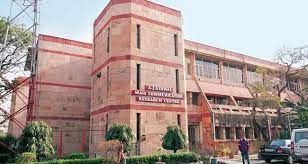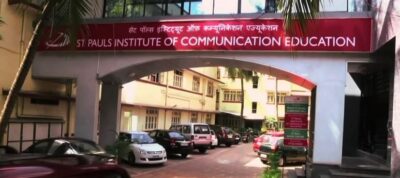Best Journalism Colleges in India

Table of Contents
Embarking on a career in journalism demands an education that not only polishes your skills but also opens doors to the best opportunities in the field. You’re in luck because India boasts some of the finest journalism colleges that have been shaping the media landscape for years.
From the prestigious Symbiosis in Pune, known for its MA in Mass Communication and MBA in Communication Management, to the Indian Institute of Journalism and New Media in Bangalore, which offers exclusive postgraduate programs, these institutions set the benchmark for excellence. They’re not just about textbooks and lectures; they’re about transforming you into a journalist in record time, with top-notch practical knowledge and connections to leading media houses.
Indian Institute of Mass Communication (IIMC), New Delhi
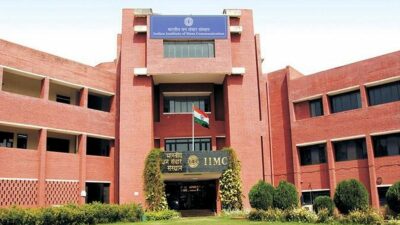
Established in 1965, the Indian Institute of Mass Communication (IIMC) stands tall amongst India’s premier journalism institutions. Its notable alumni base and prestigious reputation offer a clear indication of the institution’s excellence. When you’re looking for a combination of experienced faculty, robust curriculum, and industry connections, IIMC is a place that often ticks all the boxes.
Nestled in the heart of New Delhi, the institute provides a window into the fast-paced world of media right at the political and cultural hub of India. IIMC’s focus on practical skills ensures that students don’t just learn the theory but also apply what they’ve learned in real-world scenarios. The college provides facilities like state-of-the-art studios, libraries, and an environment that simulates the workings of professional newsrooms.
| Programme | Details |
|---|---|
| Postgraduate Diploma | Journalism (English and Hindi) |
| Postgraduate Diploma | Radio and TV Journalism |
| Postgraduate Diploma | Advertising and Public Relations |
| Diploma | Development Journalism |
The curriculum at IIMC is tailored to equip you with hands-on experience in various journalism and communication disciplines. Whether your interest lies in print, broadcast, or digital media, IIMC offers specialised courses to shape your understanding and skillset. Students also indulge in workshops and seminars led by some of the most influential names in Indian journalism.
Engaging with peers from diverse backgrounds contributes to a rich learning atmosphere, offering perspectives that are critical to the profession. IIMC has also been proactive in adapting to the digital age, embedding digital media tools and analytics into its coursework to keep its students ahead of the technological curve in journalism.
Enrolling at IIMC places you on a path frequented by many successful journalists. As you delve deeper into the world of media, you’ll find the institute’s legacy a valuable asset in your future endeavours.
Asian College of Journalism (ACJ), Chennai
When you’re eyeing a top-tier journalism education in India, the Asian College of Journalism (ACJ) in Chennai is a name that resonates with excellence. Nestled in Taramani, this prestigious institute bridges the gap between traditional journalism ethics and modern-day journalistic practices. If you’re serious about pursuing a career in media, ACJ’s curriculum is tailored to thrust you right into the heart of the industry.
ACJ’s forte lies in its two robust ten-month postgraduate diploma courses. Whether you’re drawn to the Postgraduate Diploma in Journalism (Integrated Course) or the specialised Postgraduate Diploma in Business and Financial Journalism, you’ll find a blend of in-depth academic knowledge and practical skills. The key selling point of ACJ’s programmes is the innovative mix of offline and technology-enhanced learning, ensuring that you’re well-equipped to handle the dynamic demands of news gathering and dissemination in the digital age.
| Particulars | Highlights |
|---|---|
| Courses Offered | PG Diploma: Business and Financial Journalism, Integrated Multimedia Journalism |
| Duration | 10 months |
| Fees | Rs 708,000 |
ACJ has a rich backdrop of experienced journalists and scholars that make up its faculty, guiding you through the multifaceted world of media. Interaction with these industry veterans enriches your learning experience, providing you with vital insights and hands-on practice that’s second to none. The institution’s keen focus on research, multimedia journalism, and journalism ethics positions you to be a leader in the field.
What’s more, ACJ has a stellar network of industry tie-ups that offers you opportunities that are a launchpad for your career. Picture internships and placements with names like Bloomberg, Reuters, and The Economic Times — esteemed organisations that can be the stepping stones to your success story. Despite the absence of an average package statistic, the college’s placement record with leading media houses speaks volumes about its standing and the high employability of its graduates.
Embarking on your journey in journalism at ACJ means anchoring yourself in the cultural and intellectual milieu of Chennai, a setting that’s as vibrant and diverse as the stories you’ll learn to tell.
Xavier Institute of Communications (XIC), Mumbai
Xavier Institute of Communications, established in 1969, has grown into a pivotal media education hub. Your quest for a top-tier journalism college might very well end at XIC – a part of Mumbai’s storied St. Xavier’s College Society Trust. At XIC, you’re offered an avant-garde blend of academic scholarship and professional finesse, a combination prized in today’s media landscape.
Nestled within the bustling city of Mumbai, XIC operates from two prime locations – the prestigious St. Xavier’s College campus and the St. Xavier’s High School campus. The hustle and energy of the city contribute to a dynamic learning environment, birthing professionals ready to tackle real-world media challenges.
XIC’s comprehensive curriculum includes various diploma and certificate courses, tailoring an educational experience that fits your unique career aspirations. Spearheading innovation in media education, you’ll find certificate programmes in niche areas like:
- Announcing, Broadcasting, Compering, Dubbing and E-Book Narration (ABCDE)
- Creative Writing and Photography
- Radio Jockeying and Graphic Design
These specialised courses not only enrich your skill set but also imbue XIC graduates with a distinct character recognizable in the industry.
With a legacy built over half a century, XIC stands tall as a non-governmental media centre that is one of the largest in Asia. Your education here isn’t just about textbooks and lectures; it’s an immersive experience that hones both your intellectual acumen and your practical abilities. This synergy of theory and application prepares you for an increasingly competitive and diverse media landscape.
Moreover, the institute’s emphasis on both scholarship and professionalism reflects in its reputation as a premier educator in the field, consistently ranking among the Top 40 Journalism colleges in India. Being part of such an institution means you are strategically positioned for success, equipped with training that melds traditional journalistic values with modern-day media demands.
Symbiosis Institute of Media and Communication (SIMC), Pune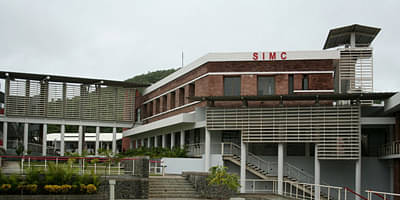
Exploring the prestigious journalism schools in India, you’ll find the Symbiosis Institute of Media and Communication (SIMC) in Pune, which stands out for its rigorous curriculum and excellent placement record. Aspiring journalists will appreciate SIMC for its practical and theoretical training, ensuring graduates are well-equipped for the dynamic media industry.
SIMC’s affiliation with Symbiosis International University propels its reputation, offering esteemed programmes such as an MBA in Communication Management and an MA in Mass Communication. Your educational experience at SIMC is enhanced by diverse scholarship opportunities. Here, categories span from University Scholarships to International Scholarships, and extend to Central Scholarship Schemes and even NHFDC Scholarships for students with disabilities, making education more accessible.
SIMC’s footprint in the media education landscape is further solidified by its national rankings. The institute is lauded as:
- 2nd Best Media School
- 2nd Best in PR & Event Management
- 2nd Best Advertising School
These achievements reflect SIMC’s dedication to fostering future leaders in journalism and media.
The institute’s placement statistics speak to the success of its programmes. With a 100% placement rate for the MA in Mass Communication Journalism stream, students transition seamlessly from academic to professional life. In fact, the highest package offered to MAMC Journalism graduates was an impressive INR 6.36 LPA, indicative of the high regard employers have for SIMC alumni.
| Rank | Placement Rate | Highest Package (INR) |
|---|---|---|
| 2nd | 100% for MAMC | 6.36 LPA |
At SIMC, you’re not just gaining an education; you’re immersing yourself in an environment that prioritizes your growth professionally and intellectually. The institution’s modern facilities and distinguished faculty serve as a foundation for innovative learning and pave the way for a successful career in journalism. With its comprehensive courses and strong industry connections, SIMC is a cornerstone for media education in India.
Lady Shri Ram College for Women (LSR), New Delhi
When your aspirations include a career in journalism, Lady Shri Ram College for Women affiliated with Delhi University should rank high on your list. Established in 1956, LSR is revered for its dynamic learning environment, tailored specifically for women leveraging a career in media. Here’s why LSR stands out:
- Courses: It offers a BA (Hons) in Journalism.
- Duration: The BA (Hons) in Journalism is a full-fledged 3-year course.
- Recognition: LSR is NIRF 9th Ranked in the College Category in India.
- Fees: The program is competitively priced at Rs 27,880 per annum.
This institution is known for fostering socially responsible journalists with an emphasis on gender-sensitive reporting. LSR ensures students are not just nurtured academically but are encouraged to foster independent voices ready to thrive in the industry.
The college’s teaching methodology is a blend of lectures, seminars, and workshops. This approach nurtures creativity, encouraging you to undertake independent projects that hone your skills. Through their in-house publication, SPACE, you’ll get the opportunity to contribute to one of the country’s best student newsletters. This exposure is invaluable for establishing a strong foothold in media.
Film screenings on campus provide a broader perspective on the narrative and visual aspects of journalism. These experiences are designed to give you an edge, equipping you with the insights needed to excel in a competitive environment. LSR’s impressive alumni network showcases the success of its programs and the institute’s capability to enable you to translate academic learning into real-world success.
Moreover, with a fee structure under Rs 2 lakh for the entire course, LSR is an attractive option for world-class education without the financial strain. You’ll enjoy state-of-the-art lab facilities that complement the course’s professional focus.
As you explore top-tier journalism institutions, keep in mind that LSR’s blend of academic rigor, industry exposure, and socially conscious education positions its graduates for success in the ever-evolving media landscape.
Department of Media and Communication Studies, Savitribai Phule Pune University
Delving into the legacy of journalism education, you won’t miss the Department of Media and Communication Studies (DMCS), anchored at the Savitribai Phule Pune University. Founded on a generous endowment back in 1956, DMCS quickly established itself as a beacon for aspiring journalists. This institution boasts a rich history with its initial offerings in Marathi Journalism harking back to the mid 20th century.
Let’s examine the academic rigor and diversity of the programs on offer. DMCS presents a blend of contemporary and traditional media studies through a robust curriculum. MSc Media & Communication Studies, MPhil/PhD Media and Communication Studies, and a PG Diploma in Indian Film Studies ensure that you’re equipped with both theoretical knowledge and practical skills.
| Course | Details |
|---|---|
| MSc Media & Communication | Postgraduate Degree |
| MPhil/PhD | Research Programs |
| PG Diploma in Indian Films | Specialization Course |
Industry connections here are significant, with heavyweights like Network 18, Times Group, and Star India routinely scouting talent from this hub. This regular influx of industry giants for campus placements signifies the reputable stature and practical relevance of the education imparted at DMCS.
Shifting focus to the evening classes structured around the lives of working students, DMCS makes advanced education accessible. The course once consisted of a two-year part-time diploma, evidence of the institute’s enduring commitment to inclusivity and flexibility.
As a prospective student, you’ll appreciate that the college not only nurtures journalistic proficiency but also encourages socially responsible reporting. Here, you’re not just gaining information; you’re learning the art of shaping narratives that matter. Peering into the alumni network, names like Viswakumar Menon and Vinod Vaidyanathan resonate with success and industry recognition, a testament to the institute’s capability to mould media stalwarts.
- BA in Journalism, Psychology, and English
- BA in Communication and Media, English, and Psychology
- MA in Media and Communication Studies
Symbiosis Institute of Media and Communication (SIMC)
As you explore the echelons of journalism education in India, SIMC stands out as a premier institution. Nestled in Pune — a city known for its educational hubs — SIMC is part of the renowned Symbiosis International University. This private institute is not just a bastion of theoretical learning but also a pragmatic haven for budding journalists and media professionals.
SIMC’s curriculum is diverse, offering specialized courses like an MBA in Communication Management and an MA in Mass Communication. These programs are designed to blend the theoretical aspects of media and communication with the hands-on experiences that truly hone your skills. What’s more, the institute provides financial aid through various scholarships. These include University Scholarships, International Scholarships, Central Scholarships Scheme, and NHFDC Scholarships for students with disabilities.
The institute’s dedication to excellence is reflected in its rankings: 2nd Best Media School, 2nd best in PR & Event School National, and 2nd Best Advertising School National. These accolades underline SIMC’s prominence in the realm of media education in India.
| SIMC’s National Rankings | Position |
|---|---|
| Best Media School | 2nd |
| PR & Event School | 2nd |
| Advertising School | 2nd |
Placements at SIMC are testament to its reputation, with a striking 100% placement rate for MAMC Journalism. Your ambition for a successful career in journalism might just find its match here with industry-standard placements. The highest package reported for MAMC Journalism students soared to an impressive INR 6.36 LPA.
The institute isn’t just focused on securing employment for its graduates. It’s committed to equipping you with the ability to navigate the media landscape with ethical consideration and social consciousness. This holistic approach to education ensures you’re not only career-ready but also prepared to make a responsible impact in society. With SIMC’s robust industry links and a culture that promotes both academic and practical learning, your journey in journalism is poised for a vibrant start.
AJK MCRC, Jamia Millia Islamia, New Delhi
Delving into the capital’s prestigious offerings, you’ll find AJK Mass Communication Research Center (AJK MCRC), a beacon of excellence in Mass Communication and Journalism. Established in 1969, this institution boasts legacy and prestige, known for nurturing some of the industry’s finest talents.
Situated within the compounds of Jamia Millia Islamia (JMI), a central university steeped in history since 1920, AJK MCRC stands out for its comprehensive MA Mass Communication program. This program is meticulously designed, combining essential hands-on production with theoretical coursework. It propels students towards mastering both technical prowess and conceptual finesse, essential in today’s dynamic media landscape.
JMI’s accreditation speaks volumes, with an A Grade from NAAC and impressive rankings: 26th in the NIRF 2023 under the BTech category and 6th in India as per the THE World University Rankings for 2023. Your foothold in this institution means aligning with academic rigour and excellent Industry Connections.
The AJK MCRC curriculum transcends traditional learning. It invites students to explore the realms of electronic media and 16mm Film production—a rare offering that cultivates both specialists and versatile media practitioners.
Entrance Exams & Infrastructure
Your journey at AJK MCRC begins with the JMI Entrance Exam, a gateway to one of the most sought-after media education experiences in India. Once admitted, you’ll engage with state-of-the-art infrastructure that supports your quest for becoming an exceptional media professional.
| Accreditation | Ranking (BTech category, NIRF 2023) | THE World University Rankings 2023 (India) |
|---|---|---|
| A Grade (NAAC) | 26th | 6th |
AJK MCRC is more than an academic institution; it’s a crucible where journalistic integrity and innovation are forged. With its immersive environment and curriculum, you’re not just preparing for a career in media—you’re gearing up to leave a mark on the industry. Embrace the blend of practical training and theoretical knowledge that paves the way for tomorrow’s media stalwarts.
Department of Media Studies, Christ University, Bengaluru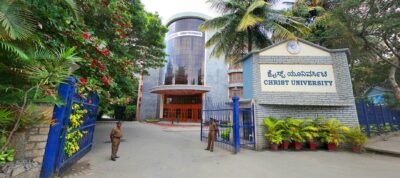
Venturing into the dynamic world of media requires not only enthusiasm but also a robust education foundation. It’s vital that you consider reputable institutions like the Department of Media Studies at Christ University, Bengaluru. This department is a beacon for budding journalists, offering a practical and theoretical blend that is second to none.
Christ University, once known as Christ College, has a rich heritage dating back to July 1969. As part of an institution that pioneered quality education in Karnataka, the media studies department has everything you need to equip yourself for the challenging media landscape. Led by Prof. John J. Kennedy and coordinated by Fr. Biju, the department shines not just in academia but in offering hands-on experience pivotal for your future career.
The university’s commitment to excellence is evident from its accreditation by the National Assessment and Accreditation Council (NAAC) and the University Grants Commission (UGC). They were the first in Karnataka to receive this recognition, standing as a testament to the high standards of education provided.
You’ll find an impressive array of courses at Christ University, with over 30 undergraduate and 40 postgraduate programs spanning diverse streams. The journalism and mass communication offerings are particularly comprehensive, including degrees like:
- BA in Communication and Media, English, Psychology
- MA in Media and Communication Studies
- MA in English with Communication Studies
With Christ University, you step into an academic cocoon that transforms into a launchpad for media careers. Their programs are structured to ensure you emerge well-versed in both modern-day tools and the traditional ethos of journalism. This balanced approach is crucial in fostering professionals who can navigate both the present and future terrains of media industries.
Beyond the classroom, you’ll find yourself amidst a network of passionate peers and mentors, an environment that fuels creativity and critical thinking. The Department of Media Studies, along with its commendable faculty, ensures that each course is a ladder to your aspirations.
As you delve deeper into your search for the ideal journalism college, remember the significance of learning from institutions with a proven track record for success. Christ University’s media studies program could be the cornerstone in building your dream career in journalism.
St. Pauls Institute of Communication Education, Mumbai
When you’re seeking a vibrant hub that blends academic excellence with practical exposure, St. Pauls Institute of Communication Education (SPICE) stands out. Nestled in the pulsing heart of Bandra, Mumbai, SPICE is more than just an educational institution; it’s where future leaders and changemakers of journalism forge their paths.
At SPICE, a 10-month PG Course in Journalism is tailored to transform aspirants into industrious journalists. Your training will not only encompass the core tenets of journalism but also equip you with the nuanced skill set essential for today’s diverse media landscape. From the penning of compelling stories to the rush of delivering breaking news, your learning experience is designed to be comprehensive.
Courses and Practical Experience
The curriculum at SPICE seamlessly marries theoretical knowledge with on-the-ground practices. Whether you’re gravitating towards broadcast, digital, or print media, you’ll graduate with a sound understanding of how newsrooms function and what being media-ready truly entails. Here’s what you can expect:
- Hands-on training in newsgathering, reporting, and editing
- Insight into the ethical dimensions of journalism
- Mastery over multimedia tools and platforms
Under the SPICE model, you’re not simply learning about journalism; you’re actively participating in the practice. Your skill set will broaden to include various media forms, ensuring you’re prepared for the dynamic demands of modern journalism.
Industry-Aligned Approach
Pioneered in 1969, SPICE’s commitment to developing professionalism in media circles remains unwavering. It’s their belief that a good journalist is not only a skilled professional but also a positive societal force. To achieve this, SPICE couples its flagship courses with a range of diploma and certificate programs, offering specialisations such as:
- Announcing, Broadcasting, Compering, Dubbing, and E-Book Narration (ABCDE)
- Creative Writing
- Photography
- Radio Jockeying
- Graphic Design
By facilitating an array of courses, SPICE ensures you have the chance to excel in your chosen niche, be it behind the camera, the microphone or the pen. This approach keeps you abreast with the ever-evolving nature of media and journalism, allowing you to emerge as a well-rounded media professional, ready to embrace the challenges of today’s fast-paced media industry.
Popular Journalism Entrance Exams in India
As you carve your path towards a career in journalism, it’s crucial to be aware of the entrance exams that open doors to some of the most prestigious institutions in India. These exams aren’t just a formality; they’re designed to gauge your aptitude and ensure you’re ready for the rigours of a top-tier media education.
IIMC Entrance Exam, the Indian Institute of Mass Communication Entrance Exam, is a gateway to specialised training in journalism. With a focus on English Media Planning and Reporting, the IIMC sharpens you for a future in both print and electronic media.
The XIC OET, or the Xavier Institute of Communication Online Entrance Test, invites aspiring journalists to prove their mettle in Cyber Media and Anchoring. It’s tailor-made for those who eye the dynamic media space with a creative and critical approach.
If you’re drawn towards in-depth news analysis and original reporting, the ACJ Entrance Exam by the Asian College of Journalism is your litmus test. The ACJ Exam welcomes graduates from various streams, though journalism graduates sometimes have a headstart.
For those with a storytelling flair, the MASCOM Entrance Exam of the Manorama School of Communication offers a curated assessment aligning with today’s media demands. From Print to Electronic Media, candidates must showcase versatility and media savviness.
The renowned Xaviers Entrance Exam and the Symbiosis Entrance Test (SET) offer an even broader spectrum. They test your comprehension, logical reasoning, general awareness, and a keen sense for media trends, integral skills for any journalist aiming for excellence.
These exams are often the first significant step in your journalism journey. To sit for these postgraduate level exams, a 50% aggregate at graduation is typically required, signalling your readiness for the next phase.
| Entrance Exam | Institution | Specialisations Covered |
|---|---|---|
| IIMC Entrance Exam | Indian Institute of Mass Communication | Print Media, Electronic Media |
| XIC OET | Xavier Institute of Communication | Cyber Media, Anchoring |
| ACJ Entrance Exam | Asian College of Journalism | English Media Planning, Reporting |
| MASCOM Entrance Exam | Manorama School of Communication | Diverse Media Specialisations |
| SET | Symbiosis Entrance Test |
Increasing popularity of Journalism in India
Journalism in India isn’t just a career; it’s a journey that you embark on to become the voice of the nation. Your passion for uncovering truth and storytelling finds a fertile ground in this diverse country. The media landscape in India has undergone a seismic shift, with an ever-increasing number of news outlets, both traditional and digital, vying for the attention of a billion-strong audience.
You’re likely aware that a career in journalism is respectable, lucrative, and driven by passion. With the explosion of social media and the 24/7 news cycle, the demand for well-trained, skilled journalists has skyrocketed. You’re not just entering a profession; you’re stepping into a role that’s integral to the functioning of India’s democracy.
Here’s why journalism stands as a popular choice:
- Rapid Expansion: The media industry in India is burgeoning at a pace unlike ever before. This means more opportunities for you to make your mark.
- Diverse Career Avenues: From investigative journalism to sports, entertainment, and more, the possibilities are vast. You’ll find your niche in this expansive field.
Did You Know? Journalism courses in India now include modules on digital media, analytics, and technology. These courses aren’t just about writing and reporting; they include comprehensive training in the latest media tools and platforms.
You’re chasing a dream that will place you at the heart of modern democracy, keeping citizens informed and holding powers accountable. Making the right educational choice is paramount, and that’s precisely why India’s top journalism colleges are sought-after. They cater to your need for practical knowledge and offer networks that open doors to leading media houses.
Choosing from India’s best requires sifting through numerous options, and it can be overwhelming. However, armed with info on the top colleges, you’ll be one step closer to claiming your place behind the news desk, camera, or microphone, ready to shape the future of Indian media.
Conclusion
Choosing the right journalism college in India can set the stage for a successful career in media. You’ve explored some of the most prestigious institutions that offer a blend of theoretical and practical learning. Whether it’s the acclaimed AJK MCRC’s comprehensive curriculum or Christ University’s balance of modern tools and traditional skills, you’re now aware of the diverse options available. With specialized programs like those at SPICE, you can tailor your education to match your career aspirations. Remember, the entrance exams are your gateway to these esteemed colleges, so it’s crucial to prepare thoroughly. Armed with this knowledge, you’re ready to embark on an exciting journey in journalism.
Frequently Asked Questions
Which institution in Mumbai offers a PG course in Journalism?
The St. Pauls Institute of Communication Education (SPICE) in Mumbai offers a 10-month postgraduate course in Journalism.
What makes AJK MCRC unique for mass communication studies?
The AJK Mass Communication Research Center offers a comprehensive MA Mass Communication program, combining hands-on production with theoretical coursework, academic rigour, industry connections, and an innovative approach to media education.
Is there a journalism program that combines theoretical and practical learning in Bengaluru?
Christ University’s Department of Media Studies provides a blend of practical and theoretical education in journalism and mass communication.
What are the popular journalism entrance exams in India?
Popular journalism entrance exams in India include the IIMC Entrance Exam, XIC OET, ACJ Entrance Exam, MASCOM Entrance Exam, and SET.
Are journalism programs in India accredited?
Yes, journalism programs in India, such as those at Christ University, are accredited by bodies like the National Assessment and Accreditation Council (NAAC) and the University Grants Commission (UGC).

